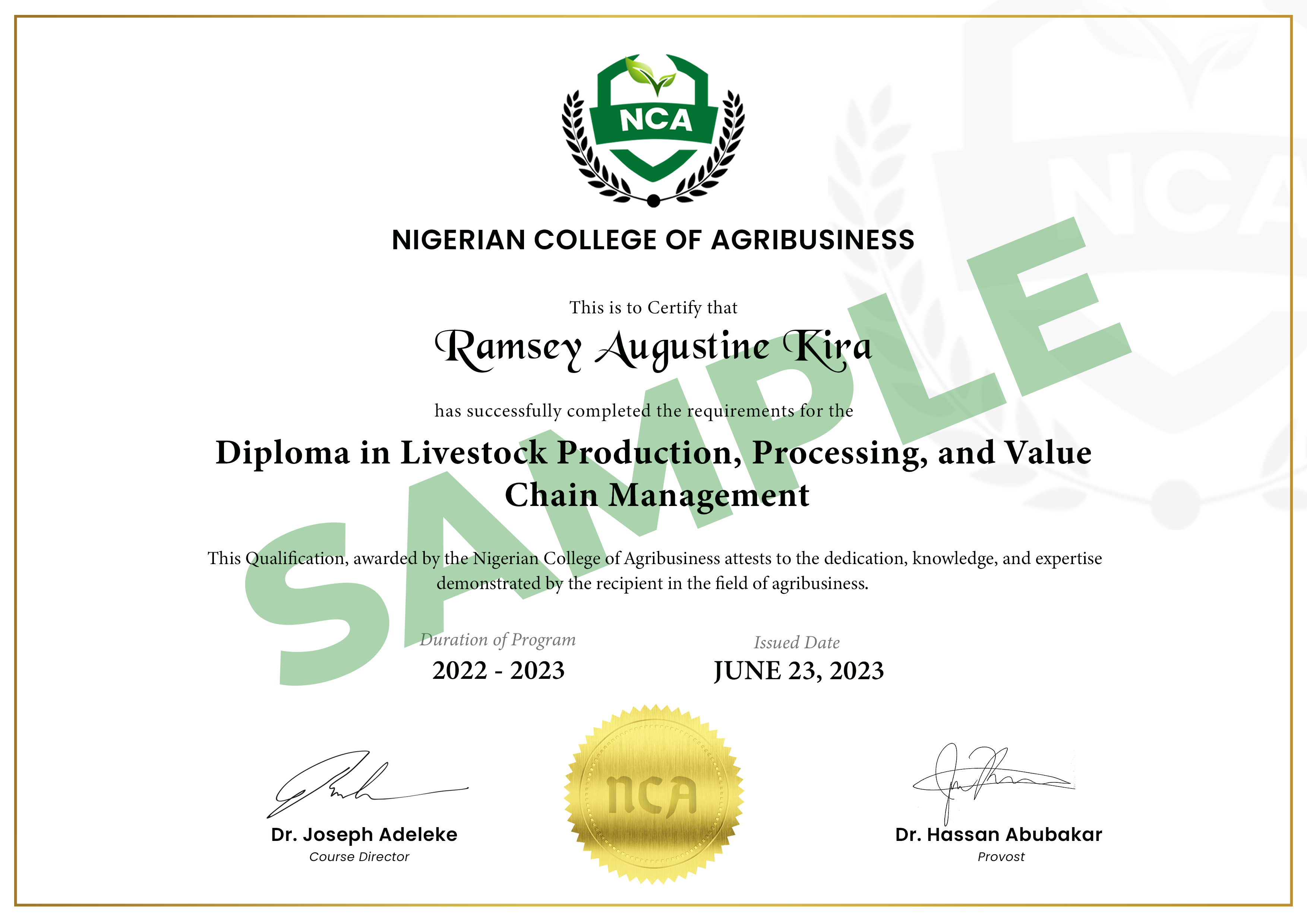The Mini MBA in Seed Business Management is a specialized program designed for managers, entrepreneurs, and investors engaged in Africa’s rapidly growing seed industry. As the demand for high-quality, locally adapted seeds increases, there is a pressing need for seed professionals who understand both the science and the business of seed production and distribution. This unique Mini MBA is crafted to build the leadership, operational, and financial acumen required to thrive in the competitive seed sector, equipping participants with strategies to scale their businesses profitably and sustainably.
Participants will gain insights into every stage of the seed value chain—from research and development to production, quality control, distribution, and marketing. This program addresses key industry challenges, such as regulatory compliance, intellectual property management, and supply chain complexities, while also emphasizing practical skills in business model design, financial management, and customer engagement.
Upon completing this program, participants will be empowered to:
a. Scale their seed businesses through innovative practices and sound financial strategies.
b. Optimize operations for maximum efficiency and profitability, leveraging best practices in quality control and production.
c. Expand market reach through targeted marketing, brand differentiation, and strategic partnerships.
Finally, participants that complete the program will earn the Mini MBA in Seed Business Management, a prestigious certification from the Nigerian College of Agribusiness, widely recognized for its excellence in agribusiness education across Africa.
This module provides a comprehensive overview of the seed industry, focusing on the key factors shaping seed businesses in Africa. Participants will learn about global seed industry trends, major players, regulatory frameworks, and emerging market opportunities.
Core Topics in Module 1 are:
a. Overview of the Seed Value Chain: Understanding the stages from research and breeding to commercialization.
b. Global and African Seed Market Dynamics: Market trends, challenges, and growth potential in Africa.
c. Regulatory Landscape: Navigating national and international seed regulations and certifications.
d. Challenges in African Seed Markets: Addressing issues like counterfeit seeds, supply chain disruptions, and pricing pressures.
e. Case Studies: Examining successful seed enterprises and market leaders in Africa and beyond.
This module focuses on building viable and scalable business models within the seed sector. Participants will learn to create strategies that drive value for customers, stakeholders, and the broader agricultural ecosystem.
Core Topics in Module 2 are:
a. Business Model Canvas for Seed Businesses: Applying the Business Model Canvas to develop profitable, customer-centered business models.
b. Customer Segmentation and Targeting: Identifying key customer groups, from smallholder farmers to large-scale agribusinesses.
c. Value Proposition Design: Developingvalue propositions that address the unique needs of different customer segments.
d. Revenue Streams and Pricing Strategies: Exploring various pricing models and revenue-generating opportunities within the seed sector.
e. Strategic Partnerships and Collaborations: Building effective partnerships with research institutions, distributors, and technology providers.
f. Capstone Project: Develop a customized business model for a seed company targeting a specific market.
This technical module covers the essentials of seed production, quality assurance, and supply chain management. Participants will gain practical knowledge to optimize production processes, maintain quality standards, and manage logistics efficiently.
Core Topics in module 3 are:
a. Seed Production Techniques: Exploring the different seed production systems for cereals, legumes, vegetables, and more.
b. Quality Control Standards: Implementing quality control measures, including germination testing, purity testing, and field inspections.
c. Supply Chain Management in Seed Business: From sourcing to delivery, managing inventory, and reducing waste.
d. Seed Processing and Storage: Techniques to ensure seed viability and quality during storage and transportation.
e. Risk Management in Seed Production: Identifying and mitigating risks such as climate impacts, pest issues, and contamination.
f. Practical Application: Develop a supply chain optimization plan for a seed business, considering the unique challenges in African markets.
Financial stability is crucial for scaling seed businesses. This module equips participants with the financial skills needed to manage budgets, access funding, and attract investment in the competitive seed market.
Core Topics in module 4 are:
a. Cost Structures in Seed Production: Analysing fixed and variable costs specific to seed production and distribution.
b. Financial Planning and Budgeting: Creating budgets and financial forecasts to support d. business growth.
c. Funding Options for Seed Companies: Exploring grants, equity financing, loans, and government support programs.
d. Investment Readiness: Preparing for investor presentations, including crafting compelling pitches and financial projections.
e. Profitability and ROI Analysis: Calculating profitability metrics and optimizing resource allocation.
f. Case Studies: Examining investment strategies and success stories of financially resilient seed businesses.
This module provides actionable insights into marketing strategies tailored to the seed sector. Participants will learn how to build a brand, communicate effectively with target audiences, and develop customer loyalty.
Core Topics in module 5:
a. Seed Business Branding: Building a distinctive and trustworthy brand in a competitive market.
b. Customer-Centric Marketing: Crafting marketing messages that resonate with farmers, agribusinesses, and other stakeholders.
c. Digital Marketing in Agriculture: Leveraging social media, email marketing, and online platforms to reach a broader audience.
d. Sales and Distribution Channels: Exploring various sales channels, including direct sales, partnerships, and digital platforms.
e. Customer Relationship Management
(CRM): Techniques for building and maintaining customer loyalty in the seed business.
f. Practical Project: Develop a comprehensive marketing plan for a seed company, including branding, target audience segmentation, and CRM strategies.
Understanding the legal aspects of seed production is essential to protect innovations and maintain compliance. This module focuses on intellectual property, certification processes, and regulatory compliance.
Core Topics in module 6:
a. Intellectual Property Rights in the Seed Industry: Protecting seed varieties and leveraging patents, trademarks, and breeder rights.
b. Seed Certification Processes: Navigating national and international certification standards to ensure quality and compliance.
c. Regulatory Compliance: Understanding and adhering to local and global seed regulations, including phytosanitary standards.
d. Counterfeit Seed Prevention: Identifying counterfeit seeds and implementing measures to protect brand reputation.
e. Case Studies: Real-life examples of compliance challenges and successes in the seed industry.
The Nigerian College of Agribusiness has about 60 faculty members—distinguished scholars, industry leaders, and mentors, with more being hired each year as we open new, progressive, and unique programs. But the story is not just in the numbers. Each year, as we launch innovative and unique programs, our faculty continues to grow, bringing in fresh perspectives and expertise. At NCA, you will learn directly from these award-winning faculty members in small classes where you will have easy access to them.
Some of the faculty members on the Mini MBA in Arable Crop Business Management are:

Prof. Andie Brisibe is a renowned Professor of Agricultural Biotechnology at the University of Calabar. He is recognized globally for his expertise in the dynamics of the global food economy. As a Visiting Professor at Campinas State University in Brazil, he leads research on business models for biofortified agricultural materials. Prof. Brisibe holds a PhD from Nagoya University in Japan and has previously served as a Professor at Nagoya City University and a Research Fellow at the National Grassland Research Institute in Copenhagen, Denmark.

Dr. Olubunmi Alawode is an expert in investment risk management within food and agricultural value chains in Africa. She has strong track record in research and consultancy, providing strategic investment frameworks in the agribusiness industry. She is a Senior Lecturer in the Department of Agricultural Economics at the University of Ibadan, where she earned her PhD in Agricultural Economics. Her expertise include value chain analysis, financial modelling, and the development of adaptive strategies for agricultural businesses in emerging markets.

Sunny Ameh is the Director for Sub-Saharan Africa at Monty’s Plant Food Company, USA, and formerly the Country Head for Syngenta Nigeria and West Africa. With a background in pharmacy and biotechnology, he is an expert in international crop nutrition and protection. Sunny is actively involved with CropLife Nigeria, the Nigerian Economic Summit Group, and serves as a visiting facilitator at the Lagos Business School (LBS). He leads the module on Strategic Leadership in Global Agrifood Operations on the Mini MBA program.

Godwin Osagbemi is a prominent financial analyst specializing in accounting and investment management for the food and agribusiness industries in Africa. A Fellow of the Institute of Chartered Accountants of Nigeria (FCA), he has served as Chief Finance Officer at PNG Gas and Senior Consultant in Risk Management at KPMG. He holds a Postgraduate Certificate in Data Analysis from Cornell University, USA, and an MBA in International Agribusiness and Food Chain Management from Lead City University, Nigeria.
| LECTURE DAYS | COURSE TITLE | TIME |
|---|---|---|
| Mondays | Risk Management in Arable Crop Farms | 8-10PM |
| Tuesdays | Strategic Business Planning for Arable Crops | 8-10PM |
| Wednesdays | Farm Supply Chain and Logistics Management | 8-10PM |
| Thursdays | Sustainable Farms and Climate Smart Agriculture | 8-10PM |
| Fridays | Strategic Market Development for Farm Produce | 8-10PM |
| Saturdays | Financial Management for Arable Crop Farms | 8-10PM |
Note: This Timetable and Lecturer’s Course Allocation can be modified from time to time.
No other institution in Africa offers such a comprehensive approach to agribusiness and development sector education as the Nigerian College of Agribusiness. We provide a unique blend of academic rigor, practical expertise, and industry connections. Here, you will learn from experienced faculty members who are experts in their fields and deeply engaged with the latest advancements in their industries. We leverage interdisciplinary knowledge and the latest research to enhance our programs, ensuring they are relevant and impactful. At NCA, you will continuously engage with thought leaders who are constantly shaping the dynamics of their industries and after graduation, you will be a life-long member of a vibrant alumni community that continually foster cross-disciplinary learning and networking.

All classes are recorded daily and made available to students, allowing them to review and reinforce key concepts at their convenience. These recordings also provide an opportunity for students who may miss a live class session to stay on track and catch up with the course content.
Individual Assignments, Group Presentations and Capstone Projects.
Local Students: N300,000
International Students: $400
25th November, 2024
Deadline for application submission ( November 23)
We seek highly motivated individuals who have demonstrated the potential to excel in a rigorous, integrated program. Candidates must demonstrate satisfactory performance in an online interview assessment, showcasing their readiness for the program’s challenges. Applicants should also have basic skills in internet navigation to ensure they can effectively participate in the program’s online format.
The Program is designed for a small cohort to facilitate close interaction between faculty and participants, and to promote strong in-class networking. Early Application is advised.
To secure a spot in the Mini MBA in Arable Crop Business Management program starting on November 25, 2024, applications must be submitted by November 23, 2024.
To apply for this program, please complete and submit the application form below.
| Contact Us | |
|---|---|
| Nigeria Head, Mini MBA Programs Nigerian College of Agribusiness 10, Bisi Akande Rd, Oluyole Estate, Ibadan Plot 502, Dalaba Crescent, Zone 5, Abuja | Email: [email protected] Tel/WhatsApp: 09023789104 (Local) +2349023789104 (International) |
| South Africa Representative Destiny Smart Durban, South Africa | Tel/WhatsApp: +27844117039 |
| Uganda Representative Mark Andrew Kampala, Uganda | Tel/WhatsApp: +256 701 9777 11 |
| Zimbabwe Representative Biriwasha Masimba Harare, Zimbabwe | Tel/WhatsApp: +256 784 121 347 |
| South Sudan Representative Cinya Robert Rufino Juba, South Sudan | Tel/Whatsapp: +256 784 121 347 |

Our mission is to cultivate a vibrant, sustainable and profitable agribusiness sector that drives economic growth and social progress across Africa and beyond.
We are committed towards educating a new generation of agribusiness sector leaders that will transform the economic fortunes of the African continent
© NCAEDU 2023 All Rights Reserved.